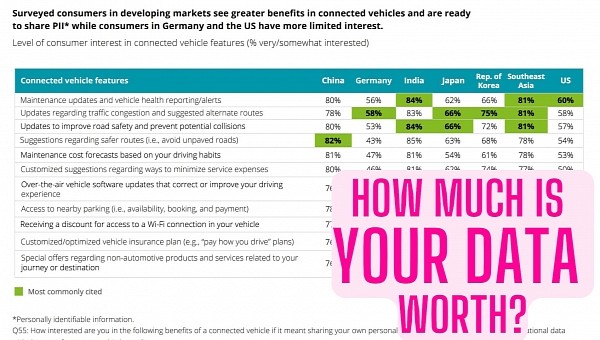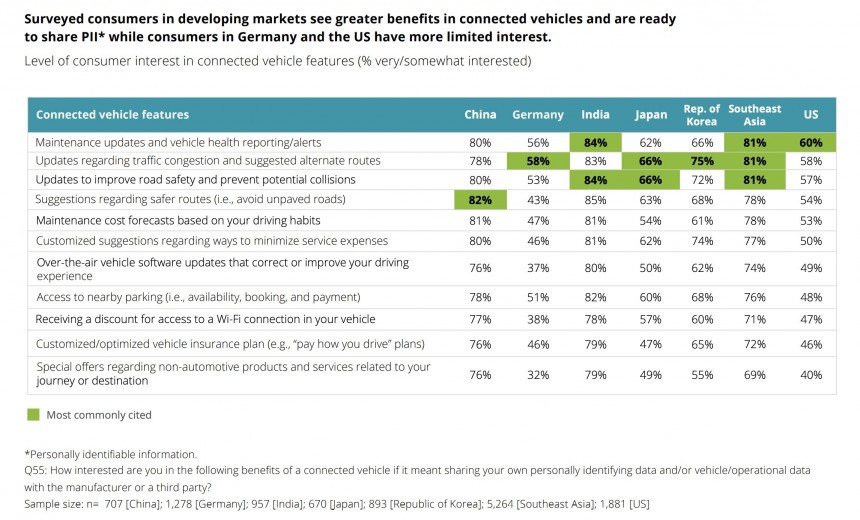The rise of connected vehicles is facing another challenge: will drivers agree to share their personally identifiable information just to get access to new-generation technology?
A recent study reveals that the answer is often no, as in some cases, less than 50 percent of the drivers would be willing to share personal information for certain connected vehicle capabilities.
The 2023 Deloitte Global Automotive Consumer Study asked drivers in several large markets, including China, Germany, India, and the United States, if they are interested in the benefits of a connected vehicle if this involves sharing personally identifying data.
The answer could be bad news for the direction the automotive industry has embraced.
The maintenance updates and vehicle health reporting and alerts enjoy particular popularity among drivers, so in Germany, 56 percent of car owners would be willing to share their personal information. In the United States, the number increases to 60 percent, while in China, it jumps to 80 percent.
Similar numbers were recorded for updates provided by the navigation apps and related to traffic congestion and suggested alternate routes. 58 percent of American drivers would provide vehicles with access to their data to get such capabilities.
The number of drivers willing to give up on their data goes down as the features they are provided with are less critical for the driving experience. For example, only 37 percent of German drivers would share personal information in exchange for over-the-air vehicle software updates. Americans are less interested in special offers for non-automotive products, so only 40 percent of them would share data for this feature. On the contrary, for 76 percent of Chinese drivers, this would be a fair deal.
Overall, German drivers seem to be the most privacy-conscious in the entire industry, as most of them wouldn’t agree to give up on their data unless the capabilities they are provided with produce a major benefit, as it’s the case with maintenance updates. At the opposite pole, Chinese drivers seem more willing to share their personal data for the full package of connected vehicle features.
User data has become a modern-world concern, mostly because parent companies often turn to third-party organizations to handle personally identifiable information. Despite the general direction, several carmakers are trying to maintain control over customer data with more privacy-conscious strategies.
BMW is one of the carmakers that are planning to use Android Automotive in their models, but instead of adopting the licensed version of the operating system, the company is likely to go for the open-source alternative that does not include Google services. The German carmaker is, therefore, trying to avoid providing Google with access to vehicle information and driver data in its models in an attempt to maintain full control over these details despite embracing the search giant’s operating system.
The 2023 Deloitte Global Automotive Consumer Study asked drivers in several large markets, including China, Germany, India, and the United States, if they are interested in the benefits of a connected vehicle if this involves sharing personally identifying data.
The answer could be bad news for the direction the automotive industry has embraced.
The maintenance updates and vehicle health reporting and alerts enjoy particular popularity among drivers, so in Germany, 56 percent of car owners would be willing to share their personal information. In the United States, the number increases to 60 percent, while in China, it jumps to 80 percent.
Similar numbers were recorded for updates provided by the navigation apps and related to traffic congestion and suggested alternate routes. 58 percent of American drivers would provide vehicles with access to their data to get such capabilities.
The number of drivers willing to give up on their data goes down as the features they are provided with are less critical for the driving experience. For example, only 37 percent of German drivers would share personal information in exchange for over-the-air vehicle software updates. Americans are less interested in special offers for non-automotive products, so only 40 percent of them would share data for this feature. On the contrary, for 76 percent of Chinese drivers, this would be a fair deal.
User data has become a modern-world concern, mostly because parent companies often turn to third-party organizations to handle personally identifiable information. Despite the general direction, several carmakers are trying to maintain control over customer data with more privacy-conscious strategies.
BMW is one of the carmakers that are planning to use Android Automotive in their models, but instead of adopting the licensed version of the operating system, the company is likely to go for the open-source alternative that does not include Google services. The German carmaker is, therefore, trying to avoid providing Google with access to vehicle information and driver data in its models in an attempt to maintain full control over these details despite embracing the search giant’s operating system.









